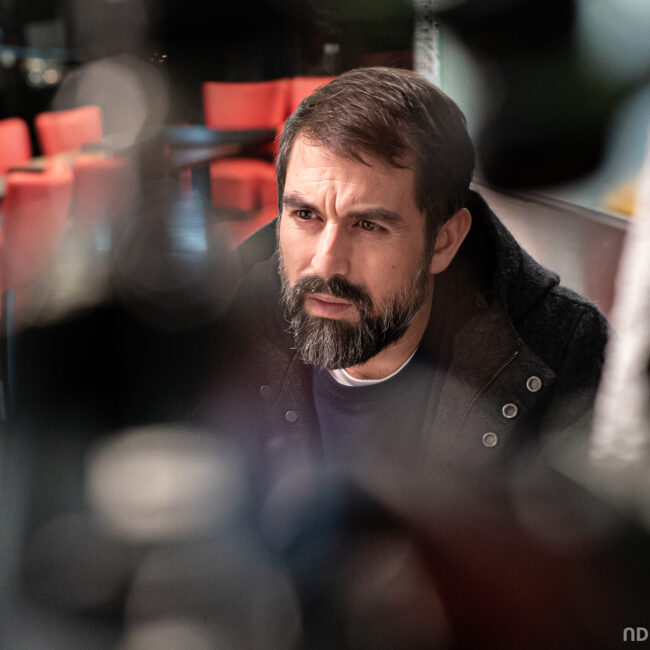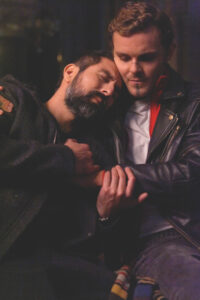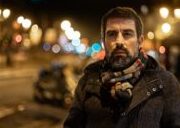
It is impossible to overlook the influence of Federico Fellini’s 8½ in especially in the surreal bits of the film when reality and illusion collide to make way for a dazzling humane effect. A middle-aged film director wandering about in a glamourous city looking for inspiration and facing his demons head-on is a cinematic trope that never betrays if done in the right manner. Hickling who directs and stars as the troubled English filmmaker Richard, shooting his fifth film in Paris, puts himself under the spotlight by questioning the essence of an artist. The setting is Paris, a city where cinema is celebrated in all its glory and the story benefits a lot from it. France as a country knows how to respect films and its film directors. Every nook and corner of Paris tells a story and it feels like Hickling is operating in familiar territory.
In the Covid era, the film takes on a new meaning of its own. For a director, a film studio or a film set is like a second home, and spending too much time in it can induce claustrophobia and can lead to stagnation of ideas. In such a scenario, the best option is to venture out into the real world and keep a lookout for fresh perspectives. On a moonlit and streetlight-lit Parisian night, Richard encounters people – some strangers and some former acquaintances – with myriad opinions and world view. He feels a strange connect with each one of them as they share their innermost thoughts and doles out life advices. Every person that he meets on that particular night talks a lot but also maintains an air of mystery about them. In a way, they are the physical manifestations of his suffering soul and existential questions that were bothering him for a long time.
 There is always a calm demeanor on Richard’s face despite the emotional and creative chaos dominating his life. An elderly person that he meets at a food joint quip about his beard-cut – that it makes him look like Jesus. During one of the surreal moments of the film, he levitates mid-air in a church giving the impression of a messiah. It can be seen as a culmination of his deep artistic desire to play God and create perfection on the cinema screen. Incidentally, he is struggling creatively and is on the search of a breakthrough.
There is always a calm demeanor on Richard’s face despite the emotional and creative chaos dominating his life. An elderly person that he meets at a food joint quip about his beard-cut – that it makes him look like Jesus. During one of the surreal moments of the film, he levitates mid-air in a church giving the impression of a messiah. It can be seen as a culmination of his deep artistic desire to play God and create perfection on the cinema screen. Incidentally, he is struggling creatively and is on the search of a breakthrough.
The ethnicity of Richard’s character can also be studied as a significant positive shift in the depiction of ethnic queer lead characters in films. His half-Indian (and half English) identity adds a layer of cultural pluralism to the narrative. It’s a rare instance in world cinema where an Indian gay character is shown in such an out-and-out explicit manner. In presenting the protagonist as an England-born filmmaker working in France who is spiritually ambiguous, director Antony Hickling gets as autobiographical as he can. The film works as a personal tale of overcoming emotional and creative roadblocks and also as a commentary on the precariousness of creating art. Being an artist is not a solitary identity – they are shaped by the people they meet and the mistakes they make. Their thoughts are nurtured by love and pain. Their worldview is affected by their past experiences. And a director’s film is only as interesting as his point of view. The camera is just a medium to project those thoughts onto the screen. Antony Hickling is an artist I would love to have a conversation with on a sizzling night in Paris.
Review by David Lagachu
Queeruru’s newest Correspondent lives in India “I am constantly trying to find a perfect balance between academia and my love for writing about films, pop and queer culture. I consider myself a global citizen and would love to be a part of a significant history of mankind.” i@maglobalcitizen
NB Down and Out in Paris in now screening FREE on YOUTUBE

